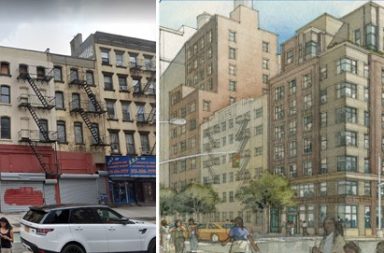During the last few months, the dissolution of New York REIT and the sale of the city buildings it owns has energized a tired local investment market.
CEO Wendy Silverstein was brought in late last year to oversee the sales of the buildings and maintain value for shareholders of the Real Estate Investment Trust. The company originated in 2010 as the non-traded American Realty Capital New York Recovery REIT; in 2014, it became New York REIT and began trading on the New York Stock Exchange. But subsequent accounting issues and a shareholder uprising led to the current liquidation process.
In the middle of this year, New York REIT owned 18 office properties, retail stores and the Viceroy hotel on West 57th Street — but many of them are now either in contract or already signed, sealed and delivered to buyers.
“The market for most of our assets is quite liquid, as there were multiple bidders for each asset,” Silverstein said during a November conference call. “We believe that there is plenty of capital and the financing markets are wide open and fairly aggressive. However, it is equally clear that pricing, in most cases, is well off its prior peak.”
She also revealed that, despite selling a major stake in its largest office building — Midtown’s One Worldwide Plaza — the REIT has decided to hang onto the majority share until the building becomes more valuable, which could take several years.
The REIT was trying to sell what was then its 49 percent share in One Worldwide Plaza before it changed tack in January. It decided to buy another 49.9 percent from its partner, George Comfort & Sons, which it did in June for $277 million. That purchase made selling its stake easier.
The Worldwide deal was first pitched by Eastdil Secured; then Darcy Stacom’s CBRE team was brought in.
Now, a 48.7 percent stake has been sold to RXR Realty and SL Green Realty Corp. Down the line, Silverstein said, New York REIT has the right to “put,” i.e., make the buyers purchase another 1.2 percent.

The new transaction with RXR and SL Green values One Worldwide Plaza at $1.72 billion.
On the November call, Silverstein said the REIT will wait between two and four years before selling its remaining share, which she added should value Worldwide at an expected $1.9 billion. The statement did not sit well with analysts, who questioned the decision to hold onto the property when the REIT’s directive was to dissolve. Silverstein countered that part of the trust’s reasoning is that a large transfer tax bill could be due if the REIT sold a stake sooner.
There are also ways to boost the building’s income in the coming years to attain that $1.9 billion valuation, she said. Silverstein cited the expiring Worldwide leases of the law firm Cravath, Swaine & Moore, which has 617,000 square feet up in 2023, and Nomura’s 820,000 square feet, up in 2033, as ones that could be provide upside if renegotiated in the future.
Both leases were also referenced by SL Green’s CEO Marc Holliday in that REIT’s October analyst call. “The relatively low price per square foot and significant future upside due to average in-place rents that are well below market made this opportunity highly appealing to us,” Holliday said, calling the dramatic West Side tower “highly financeable.” SL Green also scored a 10-year sub-4 percent interest rate for a fixed-rate financing.
For his part, RXR’s CEO Scott Rechler noted One Worldwide Plaza was the only building the company purchased this year. “We’ve been very disciplined since the beginning of 2016,” Rechler told The Post.
Worldwide was just one item on Silverstein’s to-do list. Despite several bidders for 1440 Broadway, its pricing was a disappointment to Silverstein, who had expected some $580 million. Instead, CIM Group is in contract to pay $520 million, or about $700 per square foot, for the Times Square-area office building, which the REIT bought in 2013 for $528.6 million. Like with One Worldwide Plaza, Eastdil had been listing the property and CBRE was brought in to close the deal.
“While we were somewhat disappointed in the price we achieved for 1440 Broadway,” Silverstein said, “we are confident that based on the robust and competitive bidding process, we achieved a price that reflects what is fair market value today.”
It was a solid year, according to Darcy Stacom, chairman and head of NYC capital markets at CBRE, who was referring to all of her team’s sales in 2017, not just those for New York REIT. She said, “We’ve had a very good year of consistently listing and selling — and giving good advice on where we expect it to trade.”
In a separate deal marketed by Cushman & Wakefield, Brookfield Property Partners will buy 333 W. 34th St. from New York REIT for $250 million, or $750 per square foot. The REIT had bought the Garment District office building from SL Green for $220.3 million.
Douglas Harmon’s team at Cushman & Wakefield has also completed the sale of two of the REIT’s other holdings — 245-249 W. 17th St., leased to Twitter, and 218 W. 18th St., which is Red Bull’s headquarters — to Columbia Property Trust for $514.1 million.
Harmon’s Cushman & Wakefield team also oversaw the $144 million sale of two other Garment District buildings, at 256 W. 38 St. and 229 W. 36 St., from the REIT to Brickman and its partner, Investcorp.
In August, Est4te Four, bought 150,000 square feet on the fifth through seventh floors of 50 Varick St. from the REIT. The investor and developer already owned and had renovated other portions of the Tribeca building, which is home to event venue and creative agency Spring Studios. The deal, also through Cushman & Wakefield, valued 50 Varick at $135 million.
The Interior Design Building at 306 E. 61st St. is now being marketed by Cushman & Wakefield, too. The Real Deal reported that it is expected to sell for around $50 million, which works out to $850 per square foot.

Meanwhile, Eastdil Secured is still marketing the Viceroy hotel at 120 W. 57th St., but Silverstein complained the 240-key property is not selling at a price she expected due to the city’s rocky hotel market.
“After covering high fixed costs primarily from the ground lease and union labor, the hotel is basically breaking even,” she explained on the November call. “To make the math work, prospective buyers have to get comfortable with the already high and escalating ground lease payments, underwrite a significant operational turnaround and factor in the cost to terminate the existing manager. They have therefore adjusted their pricing expectations.”
The REIT’s retail portfolio is being marketed by Jeff Fishman at RKF. These include the sale of assets in Midtown West, Tribeca, Greenwich Village and along Bleecker Street in the West Village, where they own Nos. 350, 367-369, 382-384 and 387.
“We are finding that the well-leased retail assets are still attractive to many buyers at approximately the prices we projected,” Silverstein said. “Not surprisingly, vacant retail is more difficult for both buyers and sellers to determine a fair price given the uncertainty surrounding demand from prospective retail tenants.”
As 2017 winds down, and New York REIT’s liquidation continues, nearly every one of its assets is either spoken for or in some stage of discussion with potential buyers. But for the share of Worldwide Plaza and the Viceroy, Silverstein predicted the imminent completion of the REIT’s property sales. She said, “I still feel good about getting it done by, call it, the end of March.”









